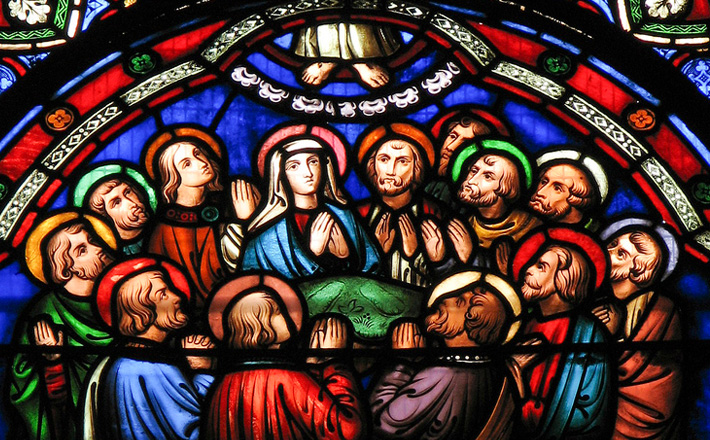Commentary on 1 Peter 4:12-14; 5:6-11
When suffering happens to religious people, it is not uncommon to hear the refrain, “Why is God punishing me?”
Leaving aside the thorny question of whether or how God is involved in suffering (the issue of theodicy), the lectionary text from 1 Peter 4 for this week suggests a quite different perspective on suffering. For the author of 1 Peter, suffering that arises from living a life centered on Jesus Christ is in no way a sign of God’s displeasure. Quite the opposite. Peter exhorts Christians who are suffering insults and scorn for their allegiance to Christ to rejoice, since they are blessed (1 Peter 4:13-14). Mocking words unfairly pointed at them are, in fact, a sign that God’s spirit rests on them!
As we see in earlier parts of 1 Peter, some of the most vulnerable persons in these house churches of Asia Minor are being pressed to give up their newfound faith and return to their former gods (4:3-4), the gods of their masters (2:18), and husbands (3:1).1 If they do so, according to those who pressure them, all will be right with the world and they will be living in line with society’s expectations. In this difficult situation, Peter calls them to remain steadfast to Christ and to persist in doing what is right, trusting in the faithful God who has created them (4:19). By doing so, they will be sharing in Christ’s sufferings, with the promise of sharing in his glory at his future revelation (4:13).
The author has already held Jesus up as the exemplar of how to navigate unjust suffering (2:18-25), with the hope that his story of suffering to exaltation will be theirs (3:18-22). Now he claims that any suffering they incur for remaining true to the Lord will actually be “sharing” (koinoneo) in Christ’s sufferings. This is language of participation and signals that they somehow join Jesus in his sufferings, just as they are promised a share in Jesus’ glorification. Whatever relational ties have been strained in their households and towns, their relationship with their Lord is deep and unbreakable. This truth can offer hope into seemingly hopeless situations of suffering, both for first-century believers and for Christians today.
The second part of the lectionary reading moves us to 1 Peter 5 and the concluding exhortations and promises of this letter. The author has just stressed the importance of service and humility among believers (5:1-5); now he calls his readers to humility before God, with the promise of exultation “in the last day” (5:6) — a resonating motif with the first lectionary text.
The author also provides a final word on the suffering that is being experienced by his audience. “After you have suffered for a little while” (5:10; CEB) echoes the first reference to suffering in the letter at 1:6: “You now rejoice in this hope [of salvation], even if it’s necessary for you to be distressed for a short time by various trials.” The brevity of present suffering is juxtaposed with the enduring quality of their salvation (1:5, 8) — theirs will be an eternal glory (5:10).
The exhortations to be clearheaded and alert (5:8) makes sense in the context of the original audience, in which believers are being pressed to abdicate faith in Christ for more traditional piety. We might invite our own audiences to think through what forces may be pressing them to practice less than full devotion to Christ. In the first-century or our present-day context, it can be easy to be on high alert and anxious about these forces and influences. Yet Peter pairs the call to alertness with the invitation to cast all anxiety upon our powerful God, who is able to provide the care they need (5:7).
The author then clarifies that the true enemy is not the neighbor or family member who does not yet believe. Instead, it is the devil — the epitome of evil, to which they need to remain alert. The description of their accuser as a lion on the prowl (5:8) would likely evoke lions of the Roman arena, with images of lions being ubiquitous especially in the eastern Greek world. This image would help to draw a clear line in the sand for the Petrine readers and accents a final time the truth that “only Christ and not Caesar is to be worshipped (2:17; 3:15).”2
While the role of these believers is to stand firm (5:9), God’s role is effusively described by four verbs: God will “restore, empower, strengthen, and establish you” (5:10). And this same God is described as powerful (5:6, 11) and “the God of all grace” (5:10). This provides the theological frame for our passage. It is within this frame that we should locate the various exhortations of 5:6-9 — as responses to this God of grace and power. Such a caring God can handle our deepest anxieties (5:7). Such a God is deserving of our faith (5:9) and worthy of the concluding blessing, “To him be power forever and always” (5:11).
Notes:
1. Brown, Jeannine K. “Silent Wives, Verbal Believers: Ethical and Hermeneutical Considerations in 1 Peter 3:1-6 and Its Context.” Word and World 24 (2004) 395-403.
2. Horrell, David G., Bradley Arnold, and Travis B. Williams. 2013. “Visuality, Vivid Description, and the Message of 1 Peter: The Significance of the Roaring Lion (1 Peter 5:8).” Journal of Biblical Literature 132 (3): 697-716.


May 28, 2017